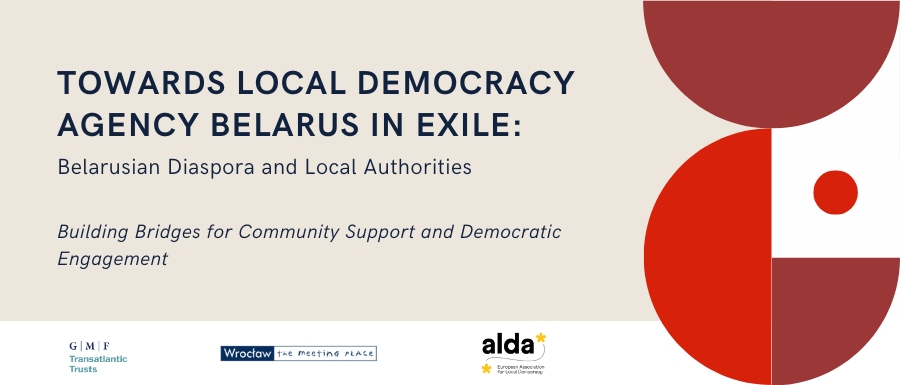On October 6th, the Municipality of Wrocław hosted a meeting in its historic City Hall, organised by ALDA – the European Association for Local Democracy, in cooperation with the Wrocław Municipality and with the support of the German Marshall Fund (GMF).
The event provided a platform for dialogue between representatives of Belarusian civil society in exile, municipal officials, and European partners, held within the framework of the project “Towards Local Democracy Agency Belarus in Exile.”
The conference opened with welcoming remarks from Ewa Gołąb-Nowakowska, representing the City of Wrocław, and Marta Sys, ALDA Governing Board Member, who both underlined the city’s longstanding commitment to inclusivity and multicultural dialogue. The speakers emphasised that Wrocław — a city built on diversity and solidarity — continues to extend its support to those seeking a new beginning, while enriching local life through their culture, skills, and civic engagement.
ALDA presented its 25 years of experience in promoting local democracy and participatory governance, introducing the Local Democracy Agency (LDA) Belarus in Exile initiative as a framework to connect local actors and empower exiled communities to engage constructively in democratic life.
Since 2009, ALDA has been working in Belarus alongside European partners and GMF to support civil society, local organisations, and democratic resilience. Through projects such as REACT, TANDEM, SPREAD, and CHOICE, ALDA promoted citizen participation, strengthened local governance, and built the capacity of civil society organisations (CSOs). However, the post-2020 crackdown following Belarus’s disputed presidential elections dismantled much of the civic space. Civil society organisations, activists, and independent media faced unprecedented repression, forcing many democratic actors into exile.
Recognising this new reality, ALDA has adapted its strategy to support Belarusian civic actors abroad. Exiled communities in Poland, Lithuania, and other countries remain deeply committed to democratic change but require structured support to continue their mission — sustaining knowledge, advocacy, and citizen participation beyond Belarus’s borders. In response to this need, ALDA has proposed the creation of a Local Democracy Agency (LDA) Belarus in Exile. Inspired by the successful LDA model launched in the Balkans in the 1990s to rebuild trust between citizens and local authorities, this new initiative will act as a multi-stakeholder platform for Belarusian civil society in exile. Its main objectives include:
- Supporting the democratic resilience of Belarusian CSOs and activists forced abroad.
- Fostering local democracy practices by connecting exiled communities with local authorities in host countries.
- Amplifying Belarusian voices in the European context to keep democracy, human rights, and civic participation high on the international agenda.
- Building human capital through training and knowledge-sharing on local governance and participatory democracy.
The purpose of the Wrocław meeting was to better understand the experiences and needs of Belarusians currently residing in Wrocław and Lower Silesia, and to gather feedback on the development of the LDA Belarus in Exileinitiative.
Community representatives, researchers, and practitioners discussed key areas for further exploration — including access to public services, social integration, education, language learning, and the creation of safe spaces for cultural and civic initiatives. Participants also reflected on mental health challenges and the importance of fostering trust and connection within local communities. The discussions highlighted the value of sustained dialogue and cooperation with municipal institutions as pathways toward greater participation and resilience.
Zhanna Nogina, representing WroMigrant, showcased ongoing initiatives designed to foster intercultural understanding and inclusion. The city’s programmes — spanning education, youth engagement, intercultural dialogue, and social development — were presented as a strong foundation for developing more tailored support to newly arrived and exiled communities.
Discussions also considered how local authorities can serve as gateways to democratic participation and how partnerships with civil society can enhance mutual understanding between residents and institutions.
The concluding panel explored ways to strengthen cooperation between local authorities, European networks, and exiled communities. Speakers discussed the potential of municipal partnerships in fostering democratic resilience, sharing good practices, and supporting community-driven initiatives. The exchange underscored the importance of creating structured channels for communication and collaboration — both to address immediate integration needs and to contribute to long-term visions for democratic engagement.
Looking ahead, the event concluded with reflections on how this dialogue could evolve into concrete cooperation and future exchanges. Participants reaffirmed the importance of continued engagement between local institutions and Belarusian civil society in exile as part of a broader European effort to reinforce participatory democracy and inclusive governance.
As one of the first meetings held under the LDA Belarus in Exile framework, the conference laid the groundwork for a sustained process of collaboration — one that builds bridges between communities, cities, and democratic values across Europe.
In the coming months, within the framework of “Towards Local Democracy Belarus in Exile,” ALDA will continue to hold meetings in other cities across Poland and Lithuania to better understand the needs of Belarusian communities, collect feedback, and gather recommendations for the new initiative. The ultimate goal is to create a durable bridge between Belarusian civic actors in exile and their host societies — ensuring that the struggle for democracy and citizen participation continues to thrive until it can be fully realised within Belarus itself.
